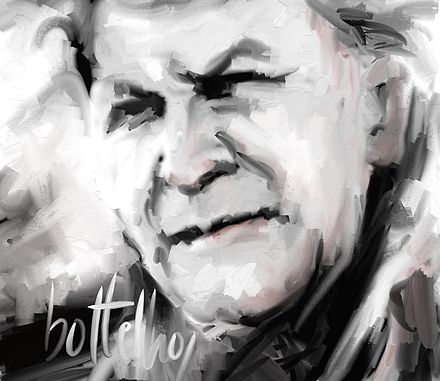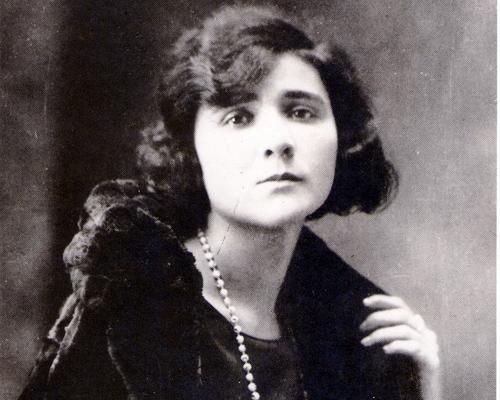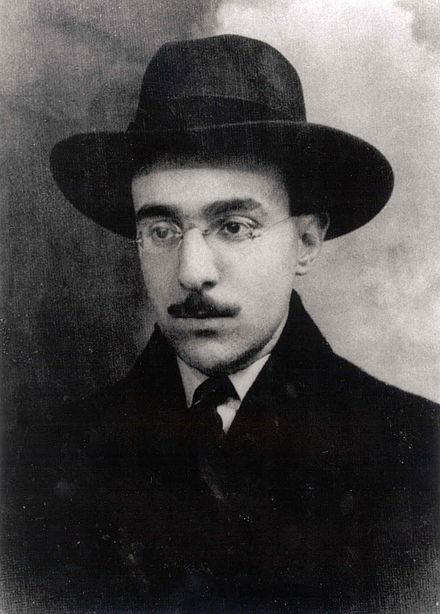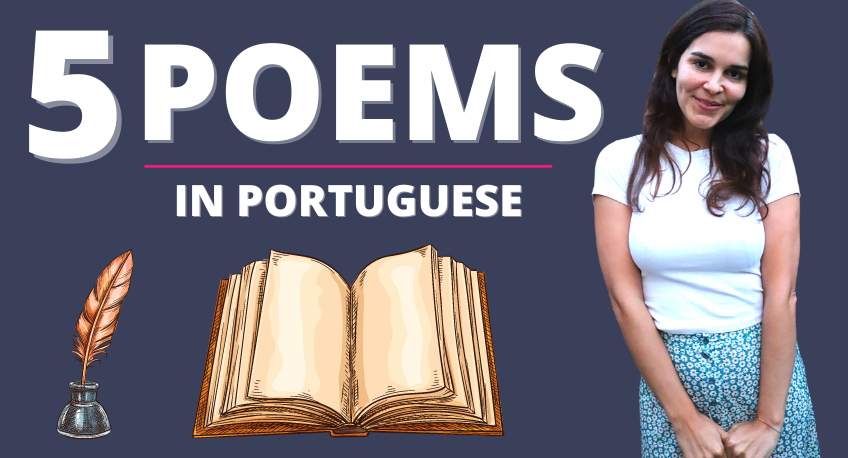Hello, dear all! Today I am going to show you 5 poems in Portuguese, from different Portuguese authors. I will add as well the English translations, in case you are still a beginner, so you can better understand the text 🙂
I also created a Youtube video where I am reading the poems. You can check it out here:
I have a lot of other useful videos on my YouTube channel, both in English and Portuguese.
So, here are my 5 favourite Portuguese poems:
É urgente o amor – Eugénio de Andrade
The first poem is called “É urgente o amor” (“Love is urgent”) and it is from Eugénio de Andrade, which is one of my favourite Portuguese poets.
So, the poem is as follows:
É urgente o amor (Eugénio de Andrade):
É urgente o amor.
É urgente um barco no mar.
É urgente destruir certas palavras,
ódio, solidão e crueldade,
alguns lamentos,
muitas espadas.
É urgente inventar alegria,
multiplicar os beijos, as searas,
é urgente descobrir rosas e rios
e manhãs claras.
Cai o silêncio nos ombros e a luz
impura, até doer.
É urgente o amor, é urgente
permanecer.
É urgente o amor – Love is urgent (Eugénio de Andrade) English Translation:
Love is urgent
It is urgent a boat in the sea.
It is urgent to destroy certain words,
hatred, loneliness and cruelty,
some sorrows,
many swords.
It is urgent to make up joy,
to multiply the kisses, the cornfields,
it is urgent to discover roses and rivers
and bright mornings.
The silence falls on the shoulders and the impure
light, until it hurts.
Love is urgent, it is urgent to
stay.
So, this was the first poem. What do you think about it?

Poema à mãe – Eugénio de Andrade
The second poem is a poem dedicated to all the mothers, it is a poem that is called “Poema à mãe” (“Poem to the mother”) and it is also from Eugénio de Andrade.
Poema à mãe (Eugénio de Andrade):
No mais fundo de ti,
eu sei que traí, mãe!
Tudo porque já não sou
o retrato adormecido
no fundo dos teus olhos!
Tudo porque tu ignoras
que há leitos onde o frio não se demora
e noites rumorosas de águas matinais!
Por isso, às vezes, as palavras que te digo
são duras, mãe,
e o nosso amor é infeliz.
Tudo porque perdi as rosas brancas
que apertava junto ao coração
no retrato da moldura!
Se soubesses como ainda amo as rosas,
talvez não enchesses as horas de pesadelos…
Mas tu esqueceste muita coisa!
Esqueceste que as minhas pernas cresceram,
que todo o meu corpo cresceu,
e até o meu coração
ficou enorme, mãe!
Olha – queres ouvir-me? -,
às vezes ainda sou o menino
que adormeceu nos teus olhos;
ainda aperto contra o coração
rosas tão brancas
como as que tens na moldura;
ainda oiço a tua voz:
“Era uma vez uma princesa
no meio de um laranjal…”
Mas – tu sabes! – a noite é enorme
e todo o meu corpo cresceu…
Eu saí da moldura,
dei às aves os meus olhos a beber.
Não me esqueci de nada, mãe.
Guardo a tua voz dentro de mim.
E deixo-te as rosas…
Boa noite. Eu vou com as aves!
Poema à mãe – Poem to the mother (Eugénio de Andrade) English Translation:
Deep within you,
I know I cheated, Mom!
All because I’m no longer
the sleeping portrait
in the depth of your eyes!
All because you ignore
that there are beds where the cold doesn’t linger
and rumbling nights of morning waters!
That’s why sometimes the words I say to you
are hard, mother,
and our love is unhappy.
All because I lost the white roses
that I pressed close to the heart
in the picture frame!
If you only knew how much I still love the roses,
maybe you wouldn’t fill the hours with nightmares…
But you forgot a lot!
You forgot that my legs grew,
that my whole body has grown,
and even my heart
it got huge, mom!
Look – do you wanna hear me? -,
sometimes I’m still the boy
who fell asleep in your eyes;
I still hold tight against the heart
roses so white
like the ones in the frame;
I still hear your voice:
“Once upon a time there was a princess
in the middle of an orange grove…”
But – you know! – the night is huge
and my whole body grew…
I left the frame,
I gave the birds my eyes to drink.
I didn’t forget anything, Mom.
I keep your voice inside me.
And I leave you the roses…
Goodnight. I go with the birds!
It is a very beautiful poem about growing up. Don’t you think?
Let’s check out the next one!
Aniversário – Ricardo Reis
The third poem for today is from Ricardo Reis who was one of the heteronyms of the poet Fernando Pessoa. Maybe some of you already know Fernando Pessoa. This poem is called “Aniversário” (“Birthday”) and it is one of my favourite, too.
Aniversário (Ricardo Reis):
No tempo em que festejavam o dia dos meus anos,
Eu era feliz e ninguém estava morto.
Na casa antiga, até eu fazer anos era uma tradição de há séculos,
E a alegria de todos, e a minha, estava certa com uma religião qualquer.
No tempo em que festejavam o dia dos meus anos,
Eu tinha a grande saúde de não perceber coisa nenhuma,
De ser inteligente para entre a família,
E de não ter as esperanças que os outros tinham por mim.
Quando vim a ter esperanças, já não sabia ter esperanças.
Quando vim a olhar para a vida, perdera o sentido da vida.
Sim, o que fui de suposto a mim-mesmo,
O que fui de coração e parentesco.
O que fui de serões de meia-província,
O que fui de amarem-me e eu ser menino,
O que fui – ai, meu Deus!, o que só hoje sei que fui…
A que distância!…
(Nem o acho…)
O tempo em que festejavam o dia dos meus anos!
O que eu sou hoje é como a humidade no corredor do fim da casa,
Pondo grelado nas paredes…
O que eu sou hoje (e a casa dos que me amaram treme através das minhas lágrimas),
O que eu sou hoje é terem vendido a casa,
É terem morrido todos,
É estar eu sobrevivente a mim-mesmo como um fósforo frio…
No tempo em que festejavam o dia dos meus anos…
Que meu amor, como uma pessoa, esse tempo!
Desejo físico da alma de se encontrar ali outra vez,
Por uma viagem metafísica e carnal,
Com uma dualidade de eu para mim…
Comer o passado como pão de fome, sem tempo de manteiga nos dentes!
Aniversário – Birthday (Ricardo Reis) English Translation:
When they celebrated my birthday,
I was happy and nobody was dead.
In the old house, even my birthday it was a tradition for centuries,
And everyone’s joy, and mine, was sure with some kind of religion.
When they celebrated my birthday,
I had the great health of not understanding anything,
To be smart among the family,
And not having the hopes that others had for me.
When I came to hope, I no longer knew how to hope.
When I came to look at life, I had lost the meaning of life.
Yes, what I was supposed to be myself,
What I was from heart and kinship.
What I was of half-province evenings,
What I was of others loving me and me being a boy,
What I was – oh my God, what I only know today…
How far!…
(I can’t even tell…)
The time when they celebrated my birthday!
What I am today is like dampness in the hallway at the end of the house,
Putting mould on the walls…
What I am today (and the home of those who loved me trembles through my tears),
What I am today is having sold the house,
It’s that they all died,
It’s me surviving myself like a cold match…
The time when they celebrated my birthday!
That my love, as a person, this time!
The soul’s physical desire to find itself there again,
For a metaphysical and carnal journey,
With a duality of me to me…
Eating the past like hunger bread, without butter time on your teeth!
This poem is also very pretty, about being small and having our whole family with us on our birthday and not understanding the happiness we are in.
I really like this poem.

Rústica – Florbela Espanca
Ok, the forth poem is from Florbela Espanca. She is a Portuguese poet that I also really like and the poem is called “Rústica” (“Rustic”).
Rústica (Florbela Espanca):
Ser a moça mais linda do povoado,
Pisar, sempre contente, o mesmo trilho,
Ver descer sobre o ninho aconchegado
A benção do Senhor em cada filho.
Um vestido de chita bem lavado,
Cheirando a alfazema e a tomilho…
Com o luar matar a sede ao gado,
Dar às pombas o sol num grão de milho…
Ser pura como a água da cisterna,
Ter confiança numa vida eterna
Quando descer à «terra da verdade»…
Meu Deus, dai-me esta calma, esta pobreza!
Dou por elas meu trono de Princesa,
E todos os meus Reinos de Ansiedade.
Rústica – Rustic (Florbela Espanca) English Translation:
To be the most beautiful girl in the village,
Stepping, always happy, on the same track,
See descending on the cozy nest
The Lord’s blessing with every child.
A well-washed calico dress,
Smelling of lavender and thyme…
With the moonlight quenching the thirst of the cattle,
Give the doves the sun on a grain of corn…
To be pure like the water in the cistern,
Have confidence in eternal life
When descending to the «land of truth»…
My God, give me this calmness, this poverty!
For them, I give up my Princess throne,
And all my Anxiety Realms.
Mar Português – Fernando Pessoa
And finally, I have a poem from Fernando Pessoa himself, about Portugal and the discoveries, that goes like this:
Mar Português (Fernando Pessoa):
Ó mar salgado, quanto do teu sal
São lágrimas de Portugal!
Por te cruzarmos, quantas mães choraram,
Quantos filhos em vão rezaram!
Quantas noivas ficaram por casar
Para que fosses nosso, ó mar!
Valeu a pena? Tudo vale a pena
Se a alma não é pequena.
Quem quer passar além do Bojador
Tem que passar além da dor.
Deus ao mar o perigo e o abismo deu,
Mas nele é que espelhou o céu.
Mar Português – Portuguese Sea (Fernando Pessoa) English Translation:
Oh salty sea, how much of your salt
Are the tears of Portugal!
Because we crossed you, how many mothers cried,
How many children prayed in vain!
How many brides never married
So that you would be ours, oh sea!
Was It worth it? All is worth it
If the soul is not small.
Those who want to pass beyond Bojador
Have to pass beyond the pain
God gave danger and the abysm to the sea,
But it was also there where He mirrored the sky.

And that’s it. These were the five poems of different Portuguese authors that I hope you have liked and that I love. In one of my next articles, if you liked these poems, I may explain them better, I may tell you about what they speak about and yes, speak a little bit about them.
So, let me know in the comments if you would like that I tell you a bit more about these poems and explain to you what they are about.
Beijinhos,
Mia


Yes, I think that Portuguese is the most beautiful of the Romance languages, although almost every language has its charm spoken by the sensible speaker. I am always looking where the spirit of the language expresses itself best in recent times and for me that is in philosophy and poetry. Andrade and Pessoa(although he wrote much in English) for Portugal and Miguel de Unamuno, Ortega y Gasset for Spain, Borges for Argentina etc. I enjoyed your discussion with Virginia about the Portuguese of Portugal and Brazil. In Germany in my student times years ago we had teachers from Portugal and Brazil, but then I never continued with your language until recently, as I focused on English and Danish and Spanish. Very fond of it, though. A blessed 2024 to you and good luck. Bernhard
Olá, Bernhard 🙂
Yes, all the Romance languages are beautiful, I agree. I am glad you like the big Portuguese authors. That’s excellent to get to know the language more profoundly, you are right!
Are you following any Portuguese courses?
I wish you a great and blessed 2024 as well 🙂
Beijinhos,
Mia
I love the poem by Eugénio, I am stuck on the last stanza: “The silence falls on the shoulders and the impure
light, until it hurts.“
What does he mean by this? What silence does he refer to? And what is the impure light?
Olá, Marcio.
I don’t really have a straight answer for this, as authors of poems have their own ideas of why they wrote what they wrote. All I have is my own interpretation, and you can also give it another interpretation, which is fine 🙂
For me, it just means that the silence of not doing good, of not seeking love is too heavy, and the light that we shine when we don’t seek these good things might be impure. So, it’s urgent to seek love, to seek what’s good. But again, I might be completely off course here.
What do you think it means?
Beijinhos,
Mia
Excellent, dear Mia, language courses for adults should focus much more on poetry and philosophy, for some of us this is so much more meaningful, than the usual touristy stuff, food, fashion and other “basics” which, of course, is also important, but some elevated application of language here and there is uplifting, inspiring. And makes the Spirit of the language rejoice!
Bernhard Kuhn in Wisconsin
Olá, Bernhard.
Sorry for the late reply, but the message got lost for a while there. I see you’ve already commented again. Apologies for the delay.
Yes, I am glad you appreciate the poetry, and I also think it’s nice to include different learning tools to adult courses.
I try to do that in my online courses as well. Have you had a chance to check them out?
If you want, they are available here:
https://school.learn-portuguese.org/courses
Thank you for your comment and support.
If you have any questions, let me know 🙂
Beijinhos,
Mia
Reading and analyzing poems are one of the beautiful way to understand the actual meaning of it, few of them i learn when i was a kid of near about 8 or 10 years old. Thanks for sharing this, subscribed your blog for more updates..
Thank you for your comment 🙂 I am glad you liked the article!
Dear Mia, Although I am not exactly your target group I must write to express my pleasure. Your teaching initiative is great..I fell in love with Eugénio de Andrade’s poem and translated it to Swedish with your interpretation as an aid. My old friend Thomas Nydahl who has written several books about Lisboa and the fado was happy when har got my translation . My daughter Arlinda was also happy …Rústica – Rustic (Florbela Espanca) I found on the Web a few years ago and translated to Swedish.
I have never been to Portugal myself and I am now 88 and have given up travelling. But poetry and music will keep my soul on an eternal journey…
Mia, muito obrigado…
O amigo Ullmar Qvick, Suécia
Olá, amigo Ullmar!
I am so glad to hear from you 🙂 I am also really happy that you enjoyed the interpretation of my poems and that you have been able to translate them into Swedish. So nice your daughter also likes them!
That poem – “Rústica”- is an amazing one, and my mom’s favorite as well!
I am sorry you haven’t been to Portugal, but I hope you can continue to experience it through art, and music 🙂
Please let me know if you ever need my help or advice (if I can give any to such a wise man) in the future.
Beijinhos,
Mia
PS – If you said you’re not my target group, because of your age, or because you don’t want to enroll in my courses, don’t worry. I have many students your age and it’s ok if you are just here to discover Portugal and the Portuguese culture and nothing else! I am happy about it 🙂
Dear Mia! It was my luck to find your website. Eugénio de Andrade is still alive in spreading warm feelings through his poetry. So he did on Facebook yesterday with my help. The response was fine from many….
Thank you again Mia!
I love Eugénio de Andrade, really. So happy you found me too!
Beijinhos,
Mia
For some reason my longer response got deleted, I just wanted to say that poetry, literature and philosophy should be part of adult language courses in general. So: Obrigado!
Bernhard in Wisconsin
Olá, Bernhard.
Your comment was lost somehow. Apologies for that. I have now found it and answered it.
Thank you!
Mia